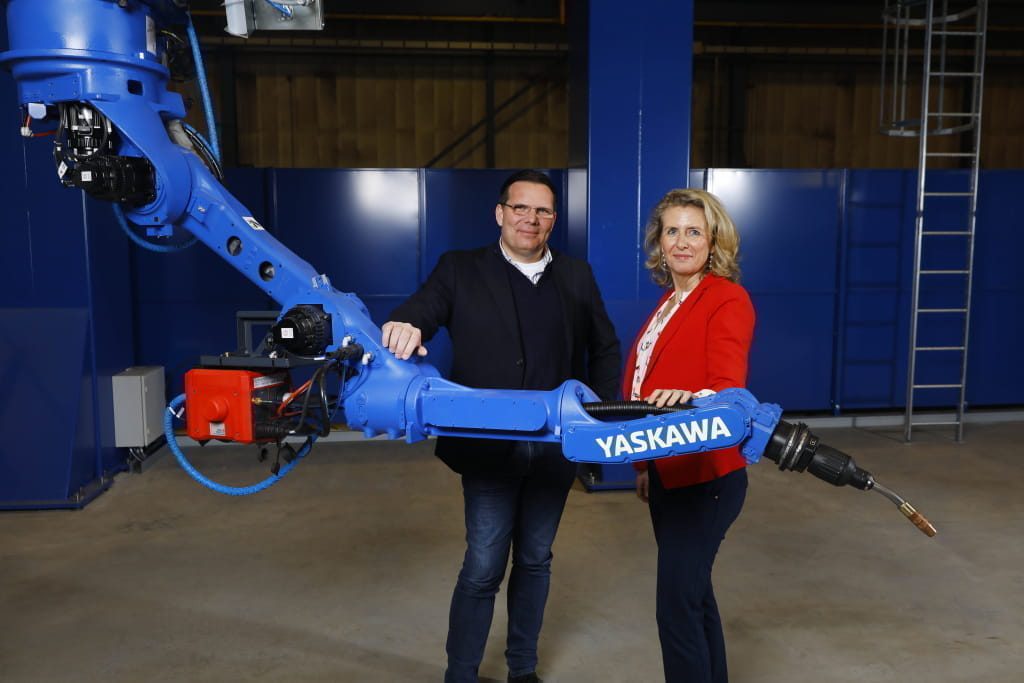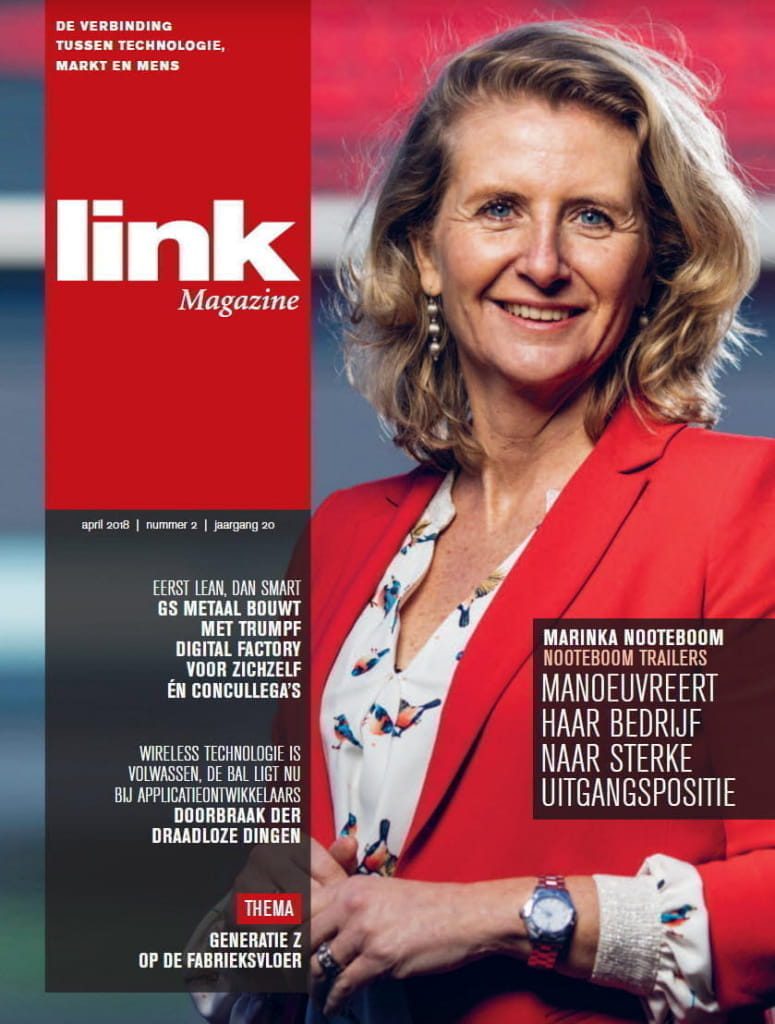Source: Link Magazine
Marinka Nooteboom manoeuvers trailer manufacturer into a strong position
- ‘It has not always been clear whether an idea was actually feasible.’
- ‘The customer can expect us to know everything about his trailers.’
- ‘There is still plenty of room for creativity.’
- ‘For us the interests of our customers are paramount.’
THE PROFESSIONALISATION STARTS HERE
BY MARTIN VAN ZAALEN
Ever-increasing customer demands, with a surge in technological innovation opportunities and a tight labour market. These three external developments compel ‘special trailer manufacturer’ Nooteboom to further professionalise their organisation. So at the moment a great deal of energy is devoted to matters such as modularisation, automation and training, in order to prepare the employees for new tasks and to make them more enterprising. The latter fits in perfectly with the leadership philosophy of the CEO who likes to place responsibilities as low as possible within the organisation. We talk to Marinka Nooteboom and Operations Manager Raymond Belderink.
We first heard from Nooteboom Trailers about the strategic developments in the spring of 2017 when the company celebrated their 135th anniversary with an Open Day. After the strategy for the coming years had been drawn up in the second half of 2017 we were given the green light to talk to Marinka Nooteboom of the trailer manufacturer
Wijchen. ‘We are now a few months into the implementation of our strategic plan and the first effects are beginning to show.’
‘WE HAVE TO DO BETTER STILL’
Nooteboom joined the company as CEO in 2012, in a time when the organisation wasn’t doing too well. In previous years the economic crisis had more or less halved the turnover and workforce. Until that time she had been working in the financial sector and although that didn’t exactly give her much knowledge of the trailer manufacturing sector it did give her an understanding of how to formulate and implement an appropriate company strategy and to maintain tight financial control. Under her leadership to company gradually began to recover and the turnover broke through the 100 million euro barrier. But she did not dwell on reaching this milestone, because the customer keeps raising the bar, wants a higher, consistent quality with a shorter lead time. At the same time there is a surge in new, digital product and processing technological innovations. The tight labour market also presents various challenges.’ That’s why we have to do better still.’
MODULARISATION
The objective is wide-ranging: to increase the efficiency and effectiveness everywhere in the production process and to do so by professionalising the organisation. One step in that process is modularisation, which has already begun. For the production they recently began to work with design rules for the engineers. ‘Previously it was not always clear whether an idea was actually feasible. The ideas were brilliant, but on further examination it often turned out that they would not be efficient to produce. We are also going to work with welding robots with tolerances that are different than those of manual welding. So we laid down some design rules and gave our engineers extra training to better understand the production processes and the possibilities available due to the application of robots. There is still plenty of room for creativity, but with more know-how so that it can be produced within the conditions of the production process.’
‘We rate self-managed teams according to their output, not their attendance.’
AUTOMATION
The introduction of welding robots in the production is part of the automation drive, another path to increase the efficiency and effectivity. To make it possible to meet the request – demand – of the customer for ever higher and more consistent quality. But also in response to that tight labour market. Raymond Belderink: ‘The customer raises the bar but the supply in the labour market is dwindling.’ So in several places machines now do the work in the process. Which machine is installed where was decided by the management in close cooperation with the employees. Completely in line with the style of the facilitating leadership that Marinka Nooteboom herself conducts and fully supports. ‘We gave them the opportunity to have a look around, at trade shows and companies that already worked with e.g. this welding technology. This was to eradicate the fear of losing their job. And to secure their support for a new way of working and to receive training for it. Because for some of the welders it means that they can go on to do other things as well, e.g. programming.’
TRAINING
So a great deal of money and energy is invested in the training of people. This is done in cooperation with three universities that together offer automotive education courses under the banner of the knowledge institute ACE (Automotive Center of Expertise), where the Nooteboom CEO sits on the Advisory Board. There are various programmes at MBO-level too. This is on the one hand to train new employees to the required level, and on the other to make sure the existing staff keeps up with the momentum of the technologic and social innovations. In certain places in the production they work with self-managed teams. Belderink: ‘The idea is to rate teams according to their output, not their attendance. For example, even if it has gone five o‘clock they will still finish assembling a specific module because they can see the bigger picture and know the colleagues can then get on with the next step in the line. Or they make the decision to stop the production of a certain module if they can see the intermediate stock space is full. So then they switch to another line.’
SALES TOO
Marinka Nooteboom adds: ‘We want to be more manoeuvrable. Put people to work where they are needed. That’s why we invest in education, in more enterprise on the shop floor. But we are also making adjustments in the work places, so that the employees see the same, familiar interface on the screens in every line and can go to work there straightaway.’ This objective of increasing the effectivity and efficiency of the organisation does not affect the engineers or the people in production only. ‘More than before, the sales advisers must make sure they offer only what we can manufacture for the agreed price. He must also, in accordance with the previous agreements, communicate with engineering so that both parties know exactly what they can expect from each other. This prevents many disruptions and delays.’ Communication with the customers must improve too. Therefore the Sales Department Newbuild, Services & Parts, Used Trailers and Delivery are now gathered under one heading – Sales & Service. ‘Service is becoming more and more important. The customer can expect us to know all about his trailers, during their entire life cycle, and that we can give him the best advice about his trailers.’
TO PREDICTIVE MAINTENANCE
Working towards this higher goal happens in all kinds of ways, anywhere in the production process and in maintenance too. At the moment service is still carried out in the standard way: preventive, periodically or after a certain number of miles. But eventually Nooteboom is aiming for predictive maintenance and the prevention of maintenance by means of all kinds of sensors in de trailer. ‘For instance, what we don’t have at the moment is some kind of warning signal on the dashboard for low tyre pressure. In our niche sector we lag behind somewhat when it comes to this type of technological development. Understandable, because the investments have to be recouped from a much smaller number of vehicles, simply because our market is smaller. But this is the direction we want to move in, because the most important thing for us is the profitability of the customer, i.e. a low total cost of ownership. So it would be good if the customer gets a warning if he loads his vehicle incorrectly, so that he can prevent unnecessary wear of the trailer.’
IN PROGRESS
According to Marinka Nooteboom there is always room for improvement. And this is particularly the case in these days of digitalisation and of social innovation. In the family business they are working hard on making these improvements. So, it’s work in progress.







